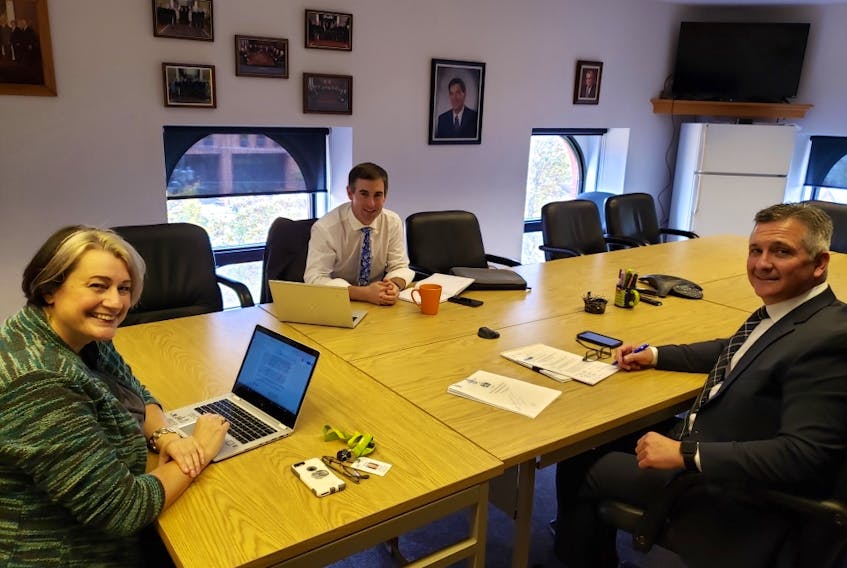CHARLOTTETOWN, P.E.I. — The fall sitting of the legislature saw a dizzying number of bills passed in what seemed like record time, but the collaborative process of the new minority government has raised questions about whether negotiations between parties have been transparent.
In an interview Friday, MLA Sidney MacEwen acknowledged that the process between house leaders is a work in progress.
"Is that debate going on behind the scenes? Is that best for true debate and true transparency? That's something we need to work on," MacEwen said in an interview with The Guardian.
The process has largely been steered by the three house leaders, MLA Hannah Bell from the Greens, MLA Heath MacDonald from the Liberals and MacEwen from the governing PCs.
MacEwen pointed out that, in previous majority governments, legislation has usually been drafted behind the scenes by departmental staff. Bills would not have been seen by opposition or the public until it was tabled in the legislature.
In the current government, after legislation goes through cabinet, MacEwen receives drafts and a brief summary of legislation, which is then circulated to the house leaders from the Green and Liberal opposition parties.
MacEwen says it is a way of finding common ground between parties, while acknowledging that disagreements still exist.
"When it's time to legislate, we're doing that for the betterment of Islanders," MacEwen said.
The house had passed a total of 25 bills over a remarkably short 11-day sitting. Twenty-one were introduced by government MLAs, three were introduced by the opposition Greens and one was introduced by a PC backbencher. The bills were substantial and ranged from the establishment of a child and youth advocate to toughening the Lands Protection Act to providing improved support for disabled Islanders.
However, the process has meant debate on substantial and complex bills has been brief. In one example, the Child and Youth Advocate Act, a significant piece of legislation introduced by Premier Dennis King himself, was debated on the floor for just over 26 minutes.
Prior to the introduction of several bills from the fall sitting, both opposition Green and Liberal parties received full, private briefings. The briefings sometimes involving departmental staff. Changes suggested by opposition Green and Liberal MLAs in private have made their way into some of these bills.
In all, the official Green Opposition requested briefings on eight of the 25 pieces passed this session.
The Support for Persons with Disabilities Act saw the longest collaborative process of any other bill. The bill set out a legislative framework for disability support services for Islanders. There were 11 amendments made to the legislation prior to its introduction in the house. The bill passed without opposition.
All of this is a far cry from how things worked during previous sittings, said Bell, who served in the same role for the Greens before last spring’s election.
"I would get a phone call half an hour before we were on the floor with a list of stuff from the government, of what they were bringing. And that was it," Bell said.
For the Greens, the relationship has been closer with the governing PC’s than with the Third Party Liberals. Bell said she and MacEwen have a “good faith and no surprises” agreement.
"We've definitely had a couple of 'what-the-hell-was-that?' moments,” Bell said.
“Often, it's been because there's been a breakdown in communication somewhere. But we've established a really solid, trusted relationship.”
She said the Greens have been able to aid in the process of legislation that benefits Islanders while still holding the government to account in the house.
"Legislation is only one place debate happens. We have motions and we have question period and we also have committee," Bell said.
On the Liberal side, house leader Heath MacDonald said the process between house leaders has meant a lot of work. He said all parties did “pretty good” in making it work.
"My fear is we sometimes erode parliamentary procedure and democracy by people [seeing] it as making deals behind closed doors," MacDonald said.
MacDonald said he had concerns about the whether the process has shortened democratic debate on the floor of the legislature.
"You still need that in-depth debate on the floor of the legislature, even if you agree to the premise of the bill entering the legislature. Your mind can change," he said.
But he also said there were limits to the traditional role of an opposition parties.
“You can't just stand up and oppose something without having a reason for it," MacDonald said.









